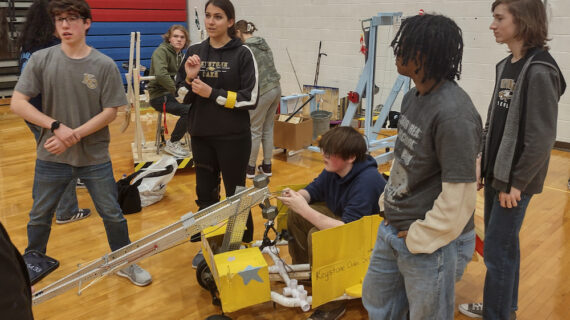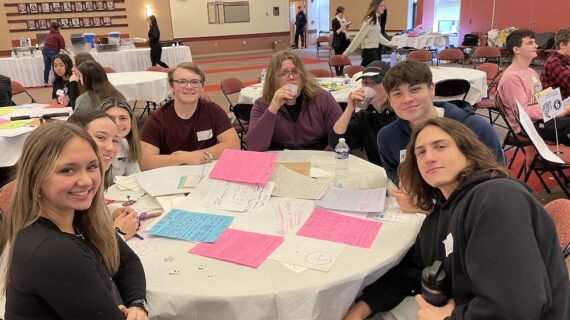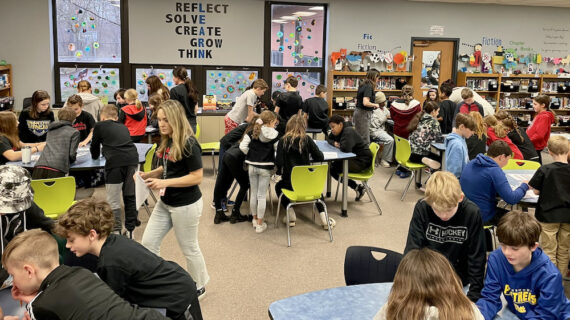
In the West Allegheny School District, students’ careers are taking off
This story is one in a series created in collaboration with the AASA Learning 2025 Alliance to celebrate the work of groundbreaking school districts in the Pittsburgh region. Kidsburgh will share these stories throughout 2024.
Picture this.
You’re a high school student beginning to wonder what to do with your future. You are attending a Career Exploration event at West Allegheny High School, and as you engage in the interactive experiences your school district has curated, you spot one that catches your eye: There, with officials from the Pittsburgh International Airport, your friends are making paper planes.
The assignment seems simple at first: Build the plane that can stay in the air the longest. But it doesn’t take long to learn that keeping an airplane afloat takes far more than folding a piece of paper. You have to consider wingspan and weight. You have to consider the wind. And you have to collaborate with people who might have a different approach.
“You realize, ‘Okay, if I’m interested in being a pilot, or in working at the airport, I need to be a system-wide thinker. I need to be a problem solver,” says Katharine Roche, the high school’s academic principal. “You start to understand what being a pilot or an engineer or an aircraft technician actually entails. And you start to wonder how you might get there.”
Fortunately, the West Allegheny School District has you covered. Because when it comes to careers, the district’s goal is more than mere exposure — it’s to offer real-world experience, relevant coursework, and accelerated pathways to the jobs of students’ dreams.
“So far this year,” says Roche, “we have four seniors who’ve already earned their professional pilot’s licenses.”
It’s par for the course in a district renowned for fast-tracking its students. West Allegheny’s Early College in High School Academy, for example, allows students to earn associate’s degrees before they’ve even finished high school. (It’s been so successful that the district aims to offer accelerated bachelors degrees, too.) Now, to match its focus on accelerated credentials, the district has launched a complementary program to help students build their careers.
Fittingly for West Allegheny, it’s called ACCELERATE: Advancing Career Connections through Experiential Learning and Exposure to Real-World Application, Training, and Exploration.
“Yes, it’s the longest acronym ever,” says Roche, laughing. “But ACCELERATE is our way of bridging the divide between what happens in the classroom and what happens in the workforce. We want to accelerate the opportunities available for our students so that they don’t have to wait until they’re 20 years old to find out if a field is really for them. Why should they wait until they’re juniors in college to take an internship, when we can offer opportunities like that right now?”

It’s this kind of question that led West Allegheny to the Western Pennsylvania Learning 2025 Alliance, a regional cohort of school districts working together — with support from The Grable Foundation — to create student-centered, equity-focused, future-driven schools. Led by local superintendents and AASA, The School Superintendents Association, the Alliance convenes to help districts like West Allegheny do what they do best: prepare every learner for tomorrow.
“We know how important it is not only to prepare our students academically, but also to ensure that by the time they leave West Allegheny, they have a clear idea of what they’re passionate about and what kinds of careers could be a good fit,” says Jerri Lynn Lippert, the district’s superintendent. Opportunities like the Alliance “keep us connected to what’s happening in the wider world.”
To that end, ACCELERATE offers six career pathways based on the current and projected demands of the modern economy. The pathways include arts, communications, and hospitality; business administration and finance; education, human, and public services; engineering, manufacturing, technology, and trades; health and natural sciences; and information technology.
At the start of each year, students work with teachers and mentors to identify the pathways that interest them and to outline potential career goals. “Let’s say you’re thinking about becoming a teacher,” explains Roche. “We have a whole suite of courses that can help you explore that: Child Development, Technology for Aspiring Teachers, Family and Community Relations, and so on.”
In addition to courses, students also select electives and workforce opportunities — including internships, tours, mentorships, and more – tailored to their interests and dreams. “So, if you want to be a teacher, we have an internship you can apply for,” says Roche. “You can actually work with teachers in West Allegheny’s afterschool programs. or even in its elementary school buildings. And you can get paid, too!” (Student education interns earn $11 an hour.)
It’s a similar story for other pathways. Students interested in health care, for example, might intern at a nearby hospital. Students interested in engineering can make $17 an hour while learning computer-aided drafting and design. And if an opportunity doesn’t yet exist for a given student’s field, the district will work to create one — already, officials are developing career experiences for students interested in everything from barbershops to church music ministries.
And Roche says the district is just getting started. “We all know, as adults, that it’s extremely beneficial to have a network of people who you can lean on,” she says. “So, we’re working to help our students get connected. We’re working to help them build that social capital so that when they go out into the world, they’re ready for it.
“And we can’t wait to see what they do.”
Want to download this story? Click here for a PDF.










